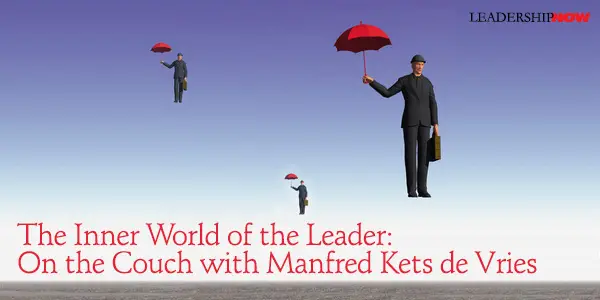 Leading Blog | Posts by Month |
 Leading Blog | Posts by Month |
02.29.12

LeadershipNow 140: February 2012 Compilation
Posted by Michael McKinney at 09:38 AM
02.20.12

5 Leadership Lessons: Where Negative Emotions Come From Brian Tracy and Christina Stein have written a book—Kiss That Frog—to help you root out the causes of the negative thoughts that are influencing your attitudes and behaviors more than you realize. It’s a critical issue for leaders. “All emotions, especially negative emotions, distort evaluations. A person in the grip of a negative emotion is incapable of thinking clearly or rationally.” Here’s the danger: “The more intense the negative emotion, the more the sufferer becomes detached from reality and is incapable of reasoning clearly. The person then talks and acts in a way that is often unexplainable and destructive.” Tracy and Stein have identified five major factors that cause people to create negative emotions and hold on to them: Rehashing negative situations allows the negative emotions to grow. Keeping an eye on these factors leading to negative emotions can help you to stop the negative emotion the moment it is triggered. You have a wonderful mind. But it is a two-edged sword. You can use it to make yourself happy, or you can use it to make yourself angry. Your goal should be to use your intelligence to keep yourself calm, in control, and at peace, no matter what is happening around you or to you. 
Posted by Michael McKinney at 10:14 PM
02.15.12

The Inner World of the Leader: On the Couch with Manfred Kets de Vries
WHY do organizations attempt to function on the basis that executives are logical, rational, dependable human beings? Kets de Vries is a clinical professor of leadership development at INSEAD. His background in economics, management, and psychoanalysis, adds a great deal of richness and context to the study of leadership. Over the last three years Jossey-Bass has published a mostly revised and updated collection of his rather large body of thoughtful-provoking writing in this series of three books. The opinion of one of the power holders in the [Harvard Business School] Organizational Behavior department was that I would never write anything. That particular person must have had a very good understanding of human behavior. One of the small pleasures of life is doing something people say you will never do. I believe that [Reflections on Character and Leadership] is my twenty-ninth book. I have always thought that academics are masters in character assassination.Kets de Vries begins the series with Reflections on Character and Leadership. In it he examines some of the major issues about leadership. What makes a leader? What is good leadership? And what is bad? What happens to organizations if a leader derails? What are the impacts of successful and failed leadership on followers and organizations? Every leader needs someone who is willing to speak out and tell the leader how it is in order to create checks and balances—the counterweight of the person in power. Without such people leaders easily derail and organizations can become paralyzed by fear, mistrust and insecurity. He explains how leaders construct organizations that are great places to work. The era of the highly structured organization is past….Clearly, some executives may not be able to deal with the ambiguities that this new kind of networking, boundary-less organization entails—the external boundaries in an organization can be removed fairly easily, but the boundaries inside people’s heads are more difficult to dissolve. Weaning some leaders away from their need for authority, structures, and controls may take considerable time and effort. In the long run, however, it will be well worth it. Eventually, they will enjoy their work more, and be more effective.Kets de Vries says that narcissism is an inescapable aspect of human nature—and leadership. It has had a generally bad press. “There is such a thing as a healthy dose and it lies somewhere on a wide spectrum that ranges from grandiosity and showmanship to denigration and coldness.” He begins Reflections on Leadership and Career Development by discussing narcissism and leadership. Leadership can be pathologically destructive or intensely inspirational. But what is it about the leaders themselves that causes them to be one or the other? I believe the answer lies in the degree of narcissism in the personality of the leader in question. He discusses the qualities characterize great leaders and the interactions, both positive and dysfunctional, between leaders and followers. “The truly effective leader “is the one who knows how to balance reflection and action by using self-insight as a restraining force when the sirens of power start singing.” He takes a look at leadership archetypes and how they operate within organizations—and how to deal with them. He concludes with an examination of the issues, anxieties, and opportunities that we face at midlife and beyond. How can we alter our perspective on life to become “twice-born”? Finally in Reflections on Groups and Organizations, Kets de Vries looks at leadership issues in the context of groups and organizations. He examines various ways in which neurotic individuals create neurotic organizations. He describes how folie à duex—literally “madness shared by two”—works in an organizational setting; how individuals’ activity or passivity and tendency toward conformism can contribute to the process and what checks and balances could be used to forestall and manage dysfunctional leader-follower relationships.Kets de Vries doesn’t believe leaders are born. While some seem to have a head start, leadership potential can be developed. “Leadership potential is a delicate interplay between nature and nurture.” An effective leader is someone, says Kets de Vries, “who is a little like a Zen riddle, or kōan—a paradox who is comfortable dealing with paradoxes. Because a leader has to be active and reflective, an introvert and an extrovert, engaged in both divergent and convergent thinking. A leader needs IQ, but also EQ. A leader has to think atomistically, but also holistically, for the short term and the long term. Anyone who can balance these contradictions effectively will do well.” He advocates the building of an organization wide coaching culture ad discuss how it can be implemented. There are several basic things that any leader has to do: provide focus, understand what makes their people tick, set an example, and make things happen. However, the distinguishing factor between mediocre and great leadership is always the same: the creation of meaning….When it comes down to it, people are searching for meaning. This series of books cannot be read quickly. Each book in the series seeks to understand leaders, human nature and its vicissitudes. They need to be reflected on. They will challenge your thinking, widen your perspective and inspire you to do better.
Posted by Michael McKinney at 04:08 PM
02.13.12

Nine Reasons Managers Struggle
FORMER CEO and president of Verizon Wireless, Denny Strigl explores nine specific behaviors that leaders do and don’t do that make them serious performers, marginal performers, or failures. In "Managers, can you hear me now?" he says it’s all about behavior.

Posted by Michael McKinney at 06:37 PM
02.10.12

Grow: Taking Your Purpose to the Next Level
Jim Stengel, former global marketing officer for Procter & Gamble, believes that businesses must rethink their purpose to achieve far better results. But not just the most apparent purpose, but a higher-order ideal or purpose. For example, Johnnie Walker exists to make great whiskey, but its higher-order ideal is to celebrate journeys of progress and success. Starbucks must make great coffee, but it must do more if it is to attract people and innovate in ways that make life better for the people they serve both inside and outside the organization. “It’s necessary,” writes Stengel in Grow, “to want to be the best-performing enterprise around, with the highest standards, the best people, and the most satisfied customers. However, this simply doesn’t aim high enough and look far enough ahead. To hit higher targets and stay out in front of the competition requires an ideal.”To that end, Starbucks also exists to create connections for self-discovery and inspiration. It’s what fuels passion and creates meaningful work. “A brand ideal of improving people’s lives is the only sustainable way to recruit, unite, and inspire all the people a business touches, from employees to customers.” Stengel believes that a higher-order brand ideal must improve people’s lives in one of five fields of fundamental human values: Eliciting Joy: Activating experiences of happiness, wonder, and limitless possibility; create moments of happiness that engage our thoughts and emotions as well as our physical senses. (Coca-Cola, Zappos, Lindt) Enabling Connection: Enhancing the ability of people to connect with one another and the world in meaningful ways. Key concepts in this field are: connect, listen, reach, and community. (Airtel, Fed Ex, Blackberry, Natura) Inspiring Exploration: Helping people explore new horizons and new experiences. Helps customers learn, gives them powerful tools, and invites them to reinvent themselves and their world. (Apple, Discovery Communications, Pampers, Red Bull) Evoking Pride: Giving people increased confidence, strength, security, and vitality; supporting self-expression and inspiring passion. (Calvin Klein, Heineken, L’Occitane) Impacting Society: Affecting society broadly, including by challenging the status quo and redefining categories. (Accenture, IBM, Method, Seventh Generation) Stengel’s bases his conclusions on a ten-year growth study involving 50,000 brands. The study tracked the connection between financial performance and customer engagement, loyalty, and advocacy. The result was “The Stengel 50.” In the 2000s, an investment in these companies would have been 400 percent more profitable than an investment in the S&P 500. “If you’re willing to embrace the same concept and align your business with a fundamental human ideal, you can achieve extraordinary growth in your own business and your own career. My research shows that your growth rate can triple.” As a side note, whether or not the study suffers from the Halo Effect is beside the point. Stengel’s point is good psychology. Success is more complex than any one factor. More good decisions than bad (intelligent people make dumb mistakes too), timing, and luck all play a part too. And then great companies get off track, not because they were doing the wrong thing, but because they stop doing them or failed to adapt appropriately. The ideas presented in Grow are what worked for Stengel for the time he was at Procter & Gamble and properly applied may work for you too. Generally, if it is based on sound principles, it’s always worth consideration. And Sengel’s ideas are. One implication of the study is interesting. Stengel reports that the “study challenged P&G’s paradigm of moving people around frequently. The companies that were growing the fastest had a different paradigm. In recruiting and hiring they looked for people whose values fit with their brands and tended to keep people working in the same areas for much longer.” He categorizes the people that run The Stengel 50 as business artists. “The fastest-growing businesses in the world have a leader whose relationship to the business is not primarily that of an operator, no matter how savvy, but an artist whose primary medium is an ideal.” The business case for ideals is about playing a role in the lives of both customers and employees at a much more important level than the competition does. It’s about connecting with people holistically: rationally and emotionally, left brain and right brain. Stengel recommends that you continually ask four questions: How well do we understand the people who are most important to our future? What do we and our brand stand for? What do we want to stand for? How are we bringing the answers to these questions to life? The power is in the answers and executing against them. What is your primary purpose? What do the people you serve care about beyond what they buy from you? Could you benefit from discovering your higher ideal? Of Related Interest:

Posted by Michael McKinney at 05:00 PM
02.08.12

Lead With Purpose
WITHOUT A CLEAR SENSE of purpose, organizations become listless. John Baldoni says in Lead With Purpose that it falls to the leader to make certain that organizational purpose is understood and acted upon. Retired Army colonel, George Reed told Baldoni that the importance of this cannot be underestimated: I don’t think you can hit purpose enough as a senior leader. It is one of those things that can be undercommunicated by an order of magnitude. You cannot oversell, overpronounce “Here’s why we’re here.”The problem is that leaders think that they have communicated it enough, but the urgencies of the day cause people to forget their original intentions and their passion. It causes leaders to forget too. Repetition is essential. Baldoni states: How well leaders use purpose to create the vision, mold the mission, and shape the values will serve as a testament to their ability to bring people together for a common cause.It may begin with an explanation of what the organization does, says Baldoni, but it is vital that it be linked to the organizational culture and values. That means having clear-cut, definite goals, putting people first, and importantly, reducing purpose to a simple and memorable statement. Baldoni has illuminated seven key people-smart things that organizations must do to succeed in the new future: Make purpose a central focus. Organizations that succeed are those that know where they are headed and why. Leaders of purpose tap into the power of narrative to help employees make sense of adversity and have faith in their organization’s ability to not just survive, but continually adapt and thrive. Instill purpose in others. Prioritize people. People have to know what they are doing and why they are being asked to do it. To cultivate and leverage high-performing people, emphasize mission, values, creation, collaboration, and execution, establish clear expectations for behavior, and embrace the credo: “Honor the workforce.” Make employees comfortable with ambiguity. Purpose can provide clarity in unsettled times. Leaders who find clarity in chaos, practice the virtues of pragmatism, and teach critical thinking skills will make living with uncertainty easier for their people—and themselves. Turn good intentions into great results. Even in a tough world and a people-sensitive company, it’s a bottom-line fact: the work still has to get done. Leaders of purpose balance creativity with practicality; keep a firm eye on efficiency, effectiveness, and accountability; and strive to instill ownership in every individual worker. Make it safe to fail (as well as prevail). Reasonable risk, daring to try something radical while keeping a grip on what works and what doesn’t, is critical to every breakthrough success. Leaders of purpose explore the impetus for change—reason, urgency, action—before leaping; respect their people’s resourcefulness; and handle setback with grace. Develop the next generation. Few senior business leaders will be in their current jobs five or ten years from now. Leaders of purpose prepare their people for a future beyond them by hiring with care, developing capable, competent employees who are able to rise to challenges and seize opportunities; and enabling others to lead. Prepare yourself. Purposeful organizations need leaders who know themselves first; have the inner compass that points them in the right direction. Many leaders never take the time to do so. Take time to reflect on what you want to do, why you want to do it, and how you will do it. Baldoni says to define purpose, you want to ask three questions: What is our vision? Vision emerges from the sense of purpose. It forms the why, but it also embraces the future as in “to become” the best, the most noted, the highest quality, or the most trusted. What is our mission? Your mission is the what of an organization; what it does. What are our values? Neither vision or mission mean much if they are not reinforced by strong values. Values shape the culture. Values enforce the behaviors that employees cherish.
 

Posted by Michael McKinney at 11:38 PM
02.06.12

5 Leadership Lessons: Great Leaders Grow Ken Blanchard and Mark Miller have penned another business fable, Great Leaders Grow. People and organizations are not fully alive unless they are growing. They ask, “will you be a leader who is always ready to face the next challenge, or will you be a leader that tries to apply yesterday’s solutions to today’s problems? The latter will ultimately fail,” say the authors. The solution is to GROW: Gain Knowledge. Gain self-knowledge, knowledge of others, your industry, and the field of leadership Reach Out to Others. You need to be proactive about helping others grow if you’re going to grow and learn. Teaching isn’t just about sharing information, it’s also about helping people draw out new learnings for themselves by the question you ask. Open Your World. You will add much more value as a leader if you open up and expand your world with leadership experiences and life experiences. Be on the lookout for experiences inside and outside work that will make you a better leader over time. Walk Toward Wisdom. Growth in wisdom has no formula, but it almost always involves at least one of four elements: rigorous self-evaluation, honest feedback, counsel from others, and time.

Posted by Michael McKinney at 09:52 PM
02.03.12

Leading Views: Ideas are Immortal. Inspiration is Perishable. In ReWork—a go-to book for inspiration—authors Jason Fried and David Hansson explain why you need to get on with it. Just do it. In ReWork—a go-to book for inspiration—authors Jason Fried and David Hansson explain why you need to get on with it. Just do it.
We all have ideas. Ideas are immortal. They last forever. What doesn’t last forever is inspiration. Inspiration is like fresh fruit or milk: It has an expiration date. If you want to do something, you’ve got to do it now. You can’t put it on the shelf and wait two months to get around to it. You can’t just say you’ll do it later. Later, you won’t be pumped up about it anymore. If you’re inspired on a Friday, swear of the weekend and dive into the project. When you’re high on inspiration, you can get two weeks work done in twenty-four hours. Inspiration is a time machine in that way.
Of Related Interest:
Posted by Michael McKinney at 05:05 PM
02.01.12

First Look: Leadership Books for February 2012Here's a look at some of the best leadership books to be released in February.




For bulk orders call 1-800-423-8273  Build your leadership library with these specials on over 120 titles. All titles are at least 40% off the list price and are available only in limited quantities. “Every reader finds himself. The writer's work is merely a kind of optical instrument that makes it possible for the reader to discern what, without this book, he would perhaps never have seen in himself.” — Marcel Proust
Posted by Michael McKinney at 12:02 AM
|
BUILD YOUR KNOWLEDGE


How to Do Your Start-Up Right STRAIGHT TALK FOR START-UPS 
Grow Your Leadership Skills NEW AND UPCOMING LEADERSHIP BOOKS 
Leadership Minute BITE-SIZE CONCEPTS YOU CAN CHEW ON 
Classic Leadership Books BOOKS TO READ BEFORE YOU LEAD |
|